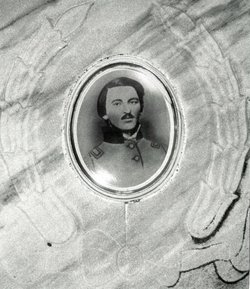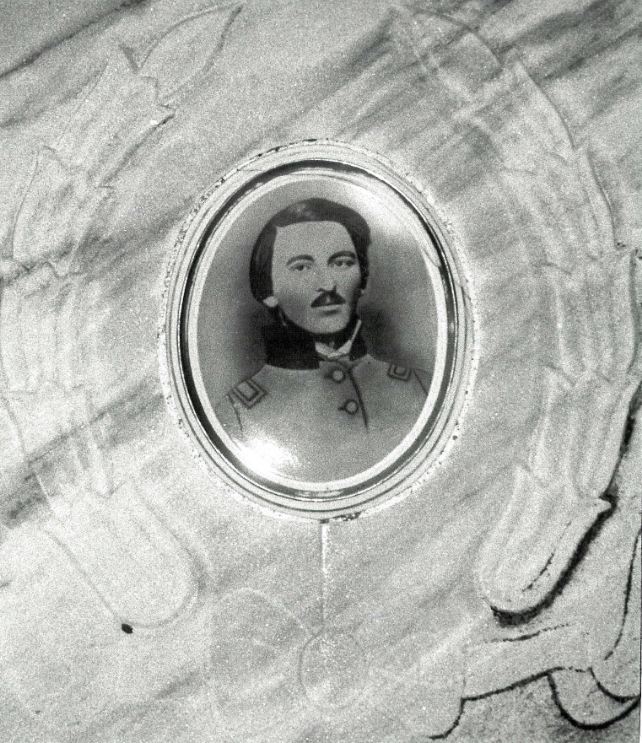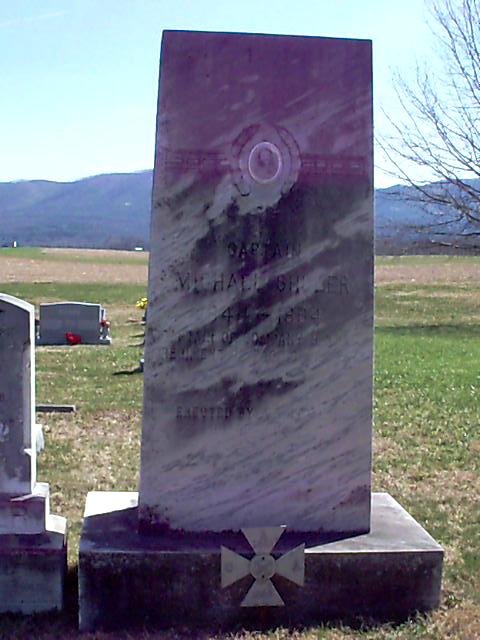Bu September 1, 1861, 1st Lt. Ambrose Booton Shenk, succeeded Rippetoe as commanding officer for the company. In turn, Shuler was raised to higher responsibilities, commissioned as 1st lieutenant on November 28, 1861. Shenk's duration as company commander was also cut short however, when he was killed at the Battle of Kernstown on March 23, 1862.
With the loss of Shenk as company commander, Shuler, as 1st lieutenant, assumed command of the "Page Grays." When the company was reorganized on April 21, 1862, Shuler, at age 18, was elected to the post of captain. He would remain in this capacity for the remainder of his military service.
Upon assuming command of the company after Kernstown, Shuler was destined to see a large portion of the battles of the 1862 Shenandoah Valley Campaign and those of the Army of Northern Virginia. During late action at the Battle of Gettysburg, on Friday, July 3, 1863, Shuler was nearly severely wounded. In a letter to Augustus S. Modesitt on July 12, 1863, Shuler, described the losses of men in his company and remarked that he had been slightly wounded in the head, being absent from the company since his wounding.
Shuler's conduct while with the 33rd may have, at times, revealed his youth. In his diary he mentioned being placed under arrest for discharging his pistol at a squirrel, probably in search of food. While this was a minor incident, a more significant one was recorded in the company muster roll of December 31, 1863. Shuler had again been placed "In arrest." The exact nature of the "disobedience of orders" charges were not made altogether clear, but, in January 1864, the young captain - still not twenty years of age - was brought before court martial. Shuler was found not guilty on a first specification and guilty on the second specification and charge. As a result, he was suspended from rank and pay for one calendar month, and ordered to be reprimanded in orders by the corps commander, Lieutenant General Richard S. Ewell.
With the victories of the past two years behind him, Shuler retained command of the company into the spring of 1864. With the appearance of General Ulysses S. Grant on the field with the Union Army of the Potomac, warfare would be taken to another level for General Robert E. Lee and his Army of Northern Virginia. As the armies began moving again in late April 1864, Shuler would finally face his own death on the battlefield. On May 5, 1864, the 33rd participated in the repulse of a Federal attack near Saunder's Field at the Battle of the Wilderness. Sometime in the fight, in the mid-afternoon, a number of Shuler's company were wounded or killed, including Captain Shuler. Recounting the loss, Lt. George D. Buswell noted that he had lost a dear old boyhood friend.
Shuler's body was recovered from the field and buried in the Shuler family cemetery in Page County. Sometime in the early 1930s, his remains were removed to this cemetery and his grave marked ca. 1938 with a large tombstone by his brother, Isaac.
Bu September 1, 1861, 1st Lt. Ambrose Booton Shenk, succeeded Rippetoe as commanding officer for the company. In turn, Shuler was raised to higher responsibilities, commissioned as 1st lieutenant on November 28, 1861. Shenk's duration as company commander was also cut short however, when he was killed at the Battle of Kernstown on March 23, 1862.
With the loss of Shenk as company commander, Shuler, as 1st lieutenant, assumed command of the "Page Grays." When the company was reorganized on April 21, 1862, Shuler, at age 18, was elected to the post of captain. He would remain in this capacity for the remainder of his military service.
Upon assuming command of the company after Kernstown, Shuler was destined to see a large portion of the battles of the 1862 Shenandoah Valley Campaign and those of the Army of Northern Virginia. During late action at the Battle of Gettysburg, on Friday, July 3, 1863, Shuler was nearly severely wounded. In a letter to Augustus S. Modesitt on July 12, 1863, Shuler, described the losses of men in his company and remarked that he had been slightly wounded in the head, being absent from the company since his wounding.
Shuler's conduct while with the 33rd may have, at times, revealed his youth. In his diary he mentioned being placed under arrest for discharging his pistol at a squirrel, probably in search of food. While this was a minor incident, a more significant one was recorded in the company muster roll of December 31, 1863. Shuler had again been placed "In arrest." The exact nature of the "disobedience of orders" charges were not made altogether clear, but, in January 1864, the young captain - still not twenty years of age - was brought before court martial. Shuler was found not guilty on a first specification and guilty on the second specification and charge. As a result, he was suspended from rank and pay for one calendar month, and ordered to be reprimanded in orders by the corps commander, Lieutenant General Richard S. Ewell.
With the victories of the past two years behind him, Shuler retained command of the company into the spring of 1864. With the appearance of General Ulysses S. Grant on the field with the Union Army of the Potomac, warfare would be taken to another level for General Robert E. Lee and his Army of Northern Virginia. As the armies began moving again in late April 1864, Shuler would finally face his own death on the battlefield. On May 5, 1864, the 33rd participated in the repulse of a Federal attack near Saunder's Field at the Battle of the Wilderness. Sometime in the fight, in the mid-afternoon, a number of Shuler's company were wounded or killed, including Captain Shuler. Recounting the loss, Lt. George D. Buswell noted that he had lost a dear old boyhood friend.
Shuler's body was recovered from the field and buried in the Shuler family cemetery in Page County. Sometime in the early 1930s, his remains were removed to this cemetery and his grave marked ca. 1938 with a large tombstone by his brother, Isaac.
Family Members
Advertisement
Advertisement














